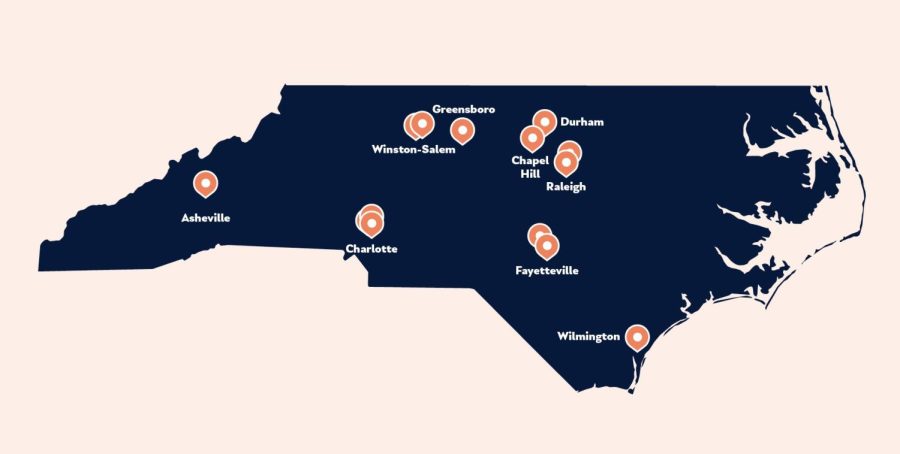20-week abortion ban is intrusive and unjust
Criminalizing abortion robs people of their medical rights and targets groups who are already highly vulnerable
August 24, 2022
The Supreme Court’s overturning of Roe v. Wade in June has now reached North Carolina.
On Wednesday, Aug. 17, a federal judge reinstated a decade-old ban on abortion after 20 weeks of pregnancy — with the exception of cases where the parent’s health is at serious risk.
The order was issued by U.S District Judge William Osteen, lifting an injunction based on Roe. In May 2019, Osteen granted the injunction because the 20-week ban was deemed unconstitutional under Roe v. Wade. However, with the fall of Roe in June, the most critical resistance to preserving reproductive rights in North Carolina has diminished.
“All parties, in this case, have undoubtedly been aware of [Dobbs v. Jackson] since it was decided nearly two months ago,” Osteen wrote in the Wednesday order. “From then on, any reliance on this court’s injunction to continue providing abortions after twenty weeks of pregnancy was not reasonable reliance.”
Before the abortion ban, North Carolina permitted abortion up until around 24 weeks, which is the time when “fetus viability” begins. This makes it one of the few southern states that allowed abortion for that long, while nine southern states had a full abortion ban in effect.
North Carolina and Florida have been a refuge for people seeking an abortion before Roe’s overturn. In 2020, a total of 30,004 abortion procedures were performed. Of these patients, 4,946 — roughly 16% — were non-residents, a number that is likely to increase in the wake of Dobbs.
However, traveling out of state for an abortion is becoming increasingly difficult even for those who have the resources to do so. The influx of patients in wake of Dobbs has extended waiting times, as well as straining clinics’ already limited resources. Now, North Carolina residents might also be forced to seek abortion by traveling to other states, a situation that most clinicians would not recommend.
“There is already confusion among providers over whether they can provide care, resulting in pregnant people being turned away in emergency situations,” a joint statement from the Center for Reproductive Rights, Planned Parenthood Federation of America, Planned Parenthood South Atlantic, the ACLU and the ACLU of North Carolina reads. “Forcing people to travel out of state for essential care or suffer through the pains of forced pregnancy puts the health of patients at unnecessary risk.”
Supporters of the ban emphasize the idea of a “fetal heartbeat” and contend that 20 weeks should give people enough time to seriously consider their options. The problem is, as pregnancy is a highly risky process, the timing of such a process is inherently medical. The politicization of medical events is a challenge to bioscience that purports to promote the well-being of both parents and children alike.
Likewise, institutionalizing pregnancy itself raises arguments over the extent to which politics should interfere with medical decisions. This statute may as well be a full abortion ban, as it intrudes on a parent’s body the moment the fetus’s body starts developing. Then the countdown starts: before 20 weeks, one is still a parent; after 20 weeks, they are a carriage of another human being.
Even if it is true that more people miscarry in the first 20 weeks of pregnancy than in the second trimester, this also means that the statute is targeting the most vulnerable minority, who definitely need help that is currently blocked by the ban.
This would create further polarization: those who don’t want a child would induce abortion in the early stage, while those who do want a child would give birth anyway. The ban would only bar those who might face second-trimester miscarriage due to issues such as chromosomal abnormalities (which account for a quarter of all miscarriages), cervical insufficiency, and other chronic diseases. Many of these causes cannot be screened during prenatal examinations.
In North Carolina, 91 (of 100) counties do not have access to abortion care. With increased fear of prosecution, fewer options will be available to those who have passed 20 weeks of pregnancy. Criminalizing abortion already discriminates against racial minority groups, and a “loose” ban would create even more division within states.
“[People’s] lives are at risk because politicians are trying to take away their right to get the medical care they need,” North Carolina Attorney General Josh Stein said. “States are trying to ban abortions in all cases, including rape, incest, and when the [parent’s] health is in danger. Denying [people] health care when their life or health is at risk violates federal law.”












